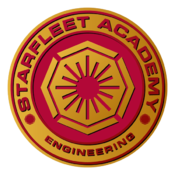Academy Majors and Minors/Engineering: Difference between revisions
No edit summary |
(Removed recommended electives which were already mandatory in the core classes. (Also, one of the electives doesn't actually exist..)) |
||
| Line 62: | Line 62: | ||
While any 9 general electives or minor classes can be used to complete your course of study, StarFleet Academy would recommend selecting from the following: | While any 9 general electives or minor classes can be used to complete your course of study, StarFleet Academy would recommend selecting from the following: | ||
* Armory: Photon Torpedoes | <!-- * Armory: Photon Torpedoes | ||
* Armory: Starship Phasers | * Armory: Starship Phasers --> | ||
* Liberal Arts: Application of Creative Design in Holodecks | * Liberal Arts: Application of Creative Design in Holodecks | ||
* Mathematics: Calculus 1 | * Mathematics: Calculus 1 | ||
| Line 80: | Line 80: | ||
* Physics: Quantum Mechanics | * Physics: Quantum Mechanics | ||
* Physics: Vibrations and Waves | * Physics: Vibrations and Waves | ||
* Physics: Warp Theory | <!-- * Physics: Warp Theory --> | ||
Cadets should total 48 credits: 21 Core, 18 Engineering (4 + 14), and 9 Elective (6 of which can be minor credits). | Cadets should total 48 credits: 21 Core, 18 Engineering (4 + 14), and 9 Elective (6 of which can be minor credits). | ||
Revision as of 09:33, 17 December 2014
| Academy Library |
|---|
Engineering Engineering Officers are responsible for the physical welfare of the ship. They ensure that all systems are working within carefully defined parameters and that any systems that are not operating within tolerances are repaired. They also carry out standard maintenance, and innovation of the ship's systems The Engineering Officer must be particularly versatile in times of crisis when emergency repairs/upgrades/alterations could be the difference between life and death for the entire crew. Engineering Cadet RequirementsEngineering personnel provide the necessary repair and upkeep of equipment aboard ship. It is suggested that prospective Engineers select one (or more) Engineering skills to specialize in. Note that StarFleet Engineers, at first, are primarily concerned with the various electronics systems throughout the ship. This is due to the Federation's heavy use of electronic equipment for almost every function. The only non-electronic equipment aboard most ships are the Warp drives and Impulse engines. However, Engineers can specialize in any Engineering field, because StarFleet encourages research and development of newer and better systems. Cadets majoring in Engineering usually take Helm/Navigation as their minor. Some smaller ships may use the Engineer as a back-up commander. Those Engineers may minor in Operations, and will want to go to Command School. Engineering MajorTo major in Engineering, a cadet must take these classes (4 credits):
And 14 credits of these classes:
While any 9 general electives or minor classes can be used to complete your course of study, StarFleet Academy would recommend selecting from the following:
Cadets should total 48 credits: 21 Core, 18 Engineering (4 + 14), and 9 Elective (6 of which can be minor credits). |
| COMMAND | ENGINEERING | SURVIVAL | HEALTH SCIENCES | ARTS & SCIENCES | |
|---|---|---|---|---|---|
| Helm & Nav. | Engineering | Security | Nursing | Counseling | Science |
| Intelligence | Com. & Ops. | Tactical | Medicine | MARINE OFFICER | |
| Majors & Minors |
|---|





